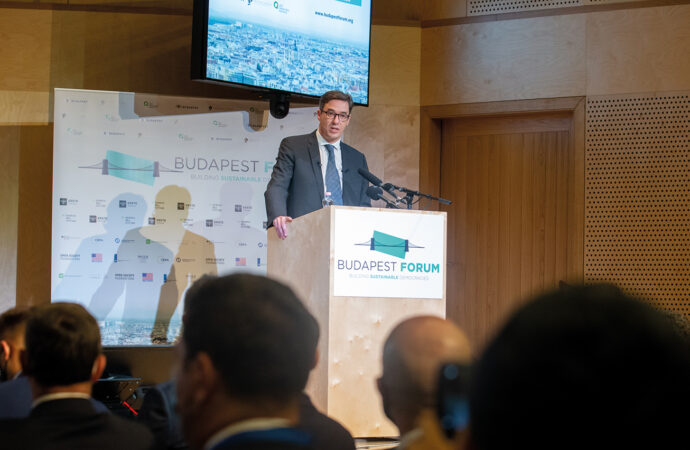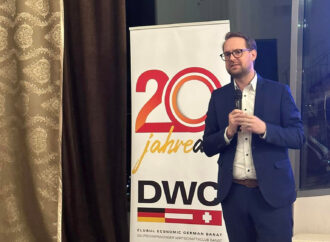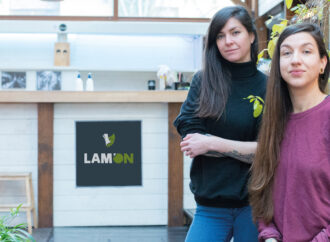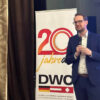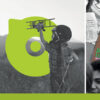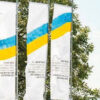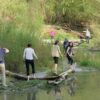Together with partners, Budapest’s city government organised the first international “Budapest Forum” in September. The forum focused on the role of cities and local initiatives in building sustainable democracies with a good quality of life. In addition to a meeting of the “Pact of Free Cities” network – whose declaration was signed by the initiating
Together with partners, Budapest’s city government organised the first international “Budapest Forum” in September. The forum focused on the role of cities and local initiatives in building sustainable democracies with a good quality of life.
In addition to a meeting of the “Pact of Free Cities” network – whose declaration was signed by the initiating (Lord) Mayors of Prague, Bratislava, Warsaw and Budapest as well as those of Ulm, Neu-Ulm, Berlin, Stuttgart, Frankfurt, Mannheim and other European cities – politicians, journalists, activists and researchers from all over the world came together to discuss democracy. The international participants made the event particularly special: among them were Věra Jourová (Vice-President of the EU Commission), Jean Asselborn (Foreign Minister of Luxembourg) and the renowned historians Anne Applebaum, Timothy Snyder and Timothy Garton Ash.
In his opening speech, Budapest’s Lord Mayor Gergely Karácsony said that communities can only function if you adopt rules that apply to everyone and create opportunities for participation and thus equal opportunities. “Democracy must not be concentrated in the hands of a few. Institutions must be modernised to facilitate citizens’ access to democracy,” he said. One example of this, he said, is the Free Cities Pact.
EU must give more support to cities
During the panel discussion “Towards Polycentric Governance”, Budapest’s deputy mayor Gábor Kerpel-Fronius explained that Hungary’s government was distancing people from democracy and that positive counter-examples had to be shown. That is why Budapest is experimenting with instruments known from other cities, for example, the participation of citizens in parts of the city budget. This is the way to get citizens to cooperate at the local level, even in a strongly divided society. Mannheim’s Lord Mayor Peter Kurz – who had received the “World Mayor International Award” for actively buil-ding networks only three days before the Forum – added that the Pact of Free Cities had also been founded as a reaction to power being concentrated in national governments and taken away from municipalities. “This is despite the fact that cities and municipalities also play an important role in the EU. Since the Union depends on them, it must strengthen them,” he stressed. The political scientist Larry Diamond summed up that democracy does not automatically survive, people have to be included again and again: “The garden of democracy has to be constantly tended and renewed”.
In the panel “A new vision for Europe: where should the EU be heading?”, political scientist Ivan Vejvoda of the Vienna Institute for Human Sciences said: “With the rise of populism comes the disenchantment of people. They need to have a sense of security, otherwise they turn to illusions and illusionists.” Social equality, he said, was fundamen-tal to the European project, also to be able to stand against right-wing populists. MEP Claudia Gamon of the Austrian NEOS party admitted that EU policy is often far away from the European citizen. During the pandemic, however, she said, it had become clear that things worked better when they were decided at European level. Her colleague Ka-talin Cseh from the Hungarian party Momentum stressed that Europe’s perspective on its cities needs to change. Brussels should fund and support them directly, and city diplomacy should be upgraded, as cities play a major role simply because of the number of inhabitants.
Daniel Hirsch,
journalist, Budapest
Presentation of the György Konrád Prize
Within the framework of the first Budapest Forum, the György Konrád Prize was also awarded for the first time. The award, established by the European Danube Academy (EDA) in Ulm, honors personalities from politics, culture and civil society who are committed to democracy, civil society or equal rights in the Danube region. The prize, which comes with 5,000 euros, was awarded to the editorial team of the independent Hungarian news portal Telex.hu. The portal was founded only a year ago after Orbán confidants reshaped Index.hu, which is now a pro-government portal, by the employees who quit there, but it is already one of the most visited websites in the country.
With the György Konrád Prize, named after the Hungarian-Jewish friend of the city of Ulm, its former mayor Ivo Gönner and EDA director Peter Langer, as well as the companion of Ulm’s Danube activities, Ulm continues its commitment to the Danube region within the framework of the European Danube Strategy. The most prominent example of this commitment is probably the International Danube Festival, which takes place every two years on both sides of the Danube. But that’s not all: Ulm has an even older tradition with democracy in the form of the “Schwörmontag” (“Oath Monday”). Since the 14th century, the “Schwörbrief” (pledging letter) has guaranteed the citizens a greater say. Every year in July, the city leaders of Ulm give an account of their actions, and the citizens and city council pledge mutual loyalty. So, it was only natural that Ulm and Neu-Ulm should also join the “Pact of the Free Cities” mentioned at the beginning. At a press conference in the Danube Office it was announced that the pact focused on the promotion of democracy, liberal rights and basic values. These values are under pressure in the whole world and have to be renewed and fought for again and again; it was said that Ulm wants to send a message with its participation in the pact.


